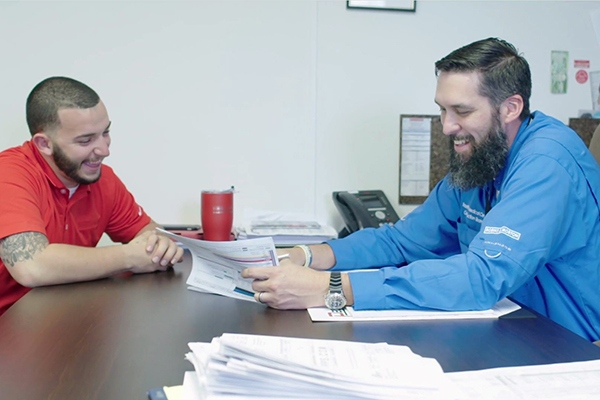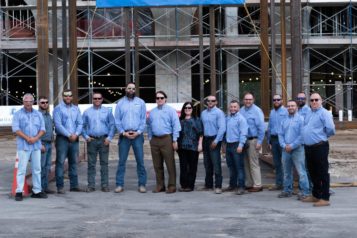
By Ryan Van Dyke
In a society where work-life blending is becoming more common and people are seeking both personal and professional fulfillment in their career, the head-down, clock-punching workplace isn’t meeting employee needs anymore.
Construction careers are especially precarious with both demand and the lack of skilled workers rising concurrently. With seemingly unlimited opportunities at the “jobsite next door” in today’s economic climate, employees who feel their skills are undervalued or are unhappy with their career trajectory are likely to leave with little risk.
Many companies have worked to improve craftworker benefits to attract and retain top talent – higher wages, top-tier benefits, paid holidays and paid time-off – but it’s not enough. There’s still a crucial element missing for so many that can only be remedied through the development of personal relationships, namely mentorship.
With the most generationally diverse workforce in history, we’re faced with the unique opportunity of motivating, challenging and reaching a variety of different people groups – millennials comprising the majority of the workforce. A recent study conducted by Deloitte reveals millennial employees intending to stay with their organization for more than five years are twice as likely to have a mentor (68%) than not (32%), demonstrating the importance of having a human connection to the success of workforce retention – the secret sauce that other benefits can’t quite cover.
Aside from studies and statistics, we can see the success of mentorship in our day-to-day work at the jobsite level. Early in my career, I was drawn to various people on my projects – those who stayed late to learn, asked especially good questions or generally just worked hard. I wanted to help those people succeed. At first, it began with tasks, helping them achieve specific objectives for their projects. Those tasks grew to broader goals, and then one day I met George.
George was 19 years old when we met and wasn’t sure about his future career path. His father worked for my company, Robins & Morton, and suggested we hire George to work as a laborer in the interim. George was smart and he worked hard. I could see that all he needed was someone to invest in him and show him what his options could be in construction, if he was interested in a long-term career in the field. Fortunately, he was, and he was talented in the various aspects of it.
I became friends with George and helped him develop a near-term career path, which included finishing his GED and establishing his next steps for a promotion. Before I knew it, he had completed those steps and we were working through an updated path. He was scaling the ranks at work and taking night classes at a local college. Today, I’m proud to say that George is an assistant superintendent on my current project at Halifax Health in Deltona, Florida.
Since then, I’ve had the opportunity to be involved in each class of Robins & Morton’s recently founded Rocky McMichen Field Leadership Program, a 15-month classroom and hands-on training course designed for craft employees that want to move into a management role. The program requires the completion of five, three-day classroom training sessions, 40 on-the-job tasks, 15 mentor/trainee experiences, six mentorship checkpoints and a final exam. Once each is completed to satisfaction, trainees earn a promotion into a foreman or assistant superintendent role.
Although the goal of the program is to provide employees with an additional route for career progression, one of its primary focuses is the mentoring aspect. This provides a natural structure for developing professional and personal relationships meant to extend long beyond the program’s end. Throughout your career, you are faced with new challenges each day and it’s immensely helpful to be able to call on someone who has faced those same challenges. Setting each trainee up for that kind of long-term relationship with their mentor is a significant part of the program’s goal.
The inaugural class of eight trainees graduated in August 2018, and the first experience showed me the impact a formal mentorship program can have on an organization. All relationships are personal through mentorship, but when tied to a program, it creates a community. The first class was able to wade through challenges together and push one another through balancing their day job along with additional course work. They were also able to celebrate with one another at graduation when they received their promotions into the next phase of their career.
Beyond graduation, you could see a ripple effect on the graduates’ jobsites. With other craftworkers seeing that they could achieve their career goals through hard work and having a true champion in their mentor, morale onsite reached unprecedented levels. The 2019 class received a record number of applicants, and they graduated on July 12.
Regardless of your company situation – large or small – mentorship is not a question of resources. It’s an investment you have to prioritize. Any time, money or effort budgeted into a mentorship program – or even mentoring one person – will benefit everyone involved. For the mentee, mentoring improves career satisfaction, career trajectory and overall professional and personal fulfillment. For the mentor, the relationship improves their ability to articulate aspects of their job. They also learn coactively from their mentee and ultimately become a better leader.
However, mentorship is not a check-the-box action. Those mentoring have to want to teach, and mentees have to want to learn. Every mentorship success story is unique, but they all have one thing in common: the mentor does their best to provide guidance, but the mentee wholeheartedly wants to see change or progression in some area of their life. Without that motivation on their part, the mentor’s guidance can only provide a limited amount of value.
Mentorship is one of the greatest weapons we have against the future challenges we face in the industry. Through it, we can keep interest alive in our craft, elevate existing talent and strengthen our experiential builders along the way.
Ryan Van Dyke is a superintendent with Robins & Morton and one the original participants who began Robins & Morton’s craft mentorship program, the Rocky McMichen Field Leadership Program.





 Join our thriving community of 70,000+ superintendents and trade professionals on LinkedIn!
Join our thriving community of 70,000+ superintendents and trade professionals on LinkedIn! Search our job board for your next opportunity, or post an opening within your company.
Search our job board for your next opportunity, or post an opening within your company. Subscribe to our monthly
Construction Superintendent eNewsletter and stay current.
Subscribe to our monthly
Construction Superintendent eNewsletter and stay current.